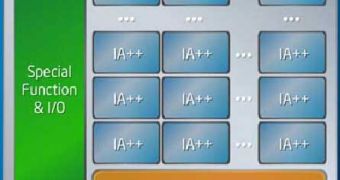The latest news on Larrabee unveils that it will come as a workstation product. It seems that Intel intends to release it in the second half of the next year, targeting the high-end market. The giant chip manufacturer appears to be planning to have the new chip on that segment of the market considered to be the most profitable one. Currently, NVIDIA accounts for about 85 percent of that market, while Intel and ATI announced their objective to grab higher market share in the area in 2009.
The workstation segment is a highly profitable market. The performance of the products needs to be greatly leveraged to gain leadership, especially given the fact that drivers have to be optimized to ensure good results, while also have to support OpenGL applications. The margins on this market can rise up to as high as sixty percent sometime. For comparison, high-end graphics cards only boost fifty percent margin.
The Larrabee designed for gaming should arrive in 2010. This desktop model will also require drivers of its own, since the focus in this area is more on DirectX APIs and less on OpenGL optimizations as for workstations.
On other news, it seems that Intel plans to make Larrabee compatible with Windows Vista and Window 7, but that Windows XP will not see the same interest. While drivers for this popular operating system will most likely not be developed, drivers for Linux are expected to appear, since there are professionals that use the OS.
It seems that Intel will invest more time and money in the future operating system, Windows 7 that is, while moving away from the old one. Windows Vista will see drivers as well, due to the fact that it is gaining some market share. Most systems today ship with Windows Vista, and there are few options of going back to Windows XP, especially when acquiring the PC from a retail store.

 14 DAY TRIAL //
14 DAY TRIAL //